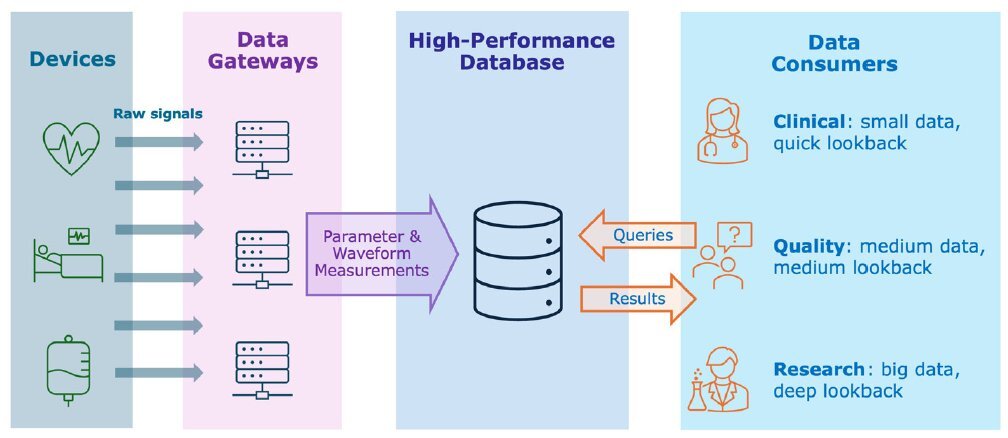How Digital Health Solution Providers Connect to IoHT
Medical devices range from simple vital sign monitors to complex imaging systems and implantable devices, each with different data formats, communication protocols, and regulatory requirements. Integrating these diverse devices into a unified system is crucial for real-time monitoring, predictive analytics, and improved patient care, but it is also challenged by incompatibilities, data standardization gaps, and security concerns. The proliferation of wearables and consumer health devices adds complexity—yet presents an opportunity to expand patient monitoring and enhance personalized care.
Developing solutions that deliver the promise of Internet of Healthcare Things (IoHT) can be difficult. To be successful, developers must capture vast amounts of medical device data in real time, so healthcare providers can gain deeper insights into their patients’ conditions, detect early warning signs sooner, and respond to critical situations faster. Medical devices, when combined with advanced data systems, can offer new levels of interoperability, real-time monitoring using AI algorithms and secondary alarm systems, and data-driven decision-making. The accessibility of realtime and historical data within a secure, centralized repository allows health tech providers to bridge data silos and support coordinated care across multiple providers and care settings.
To take advantage of these devices, developers need a data platform specifically designed for healthcare. The platform must securely manage and analyze data gathered from a variety of high-throughput bedside devices as well as IoHT-enabled medical devices. By integrating these data sources with a clinical data repository, developers can build innovative applications that enhance patient care and optimize healthcare processes and outcomes.
Using IoHT with InterSystems IRIS® for Health leverages a scalable framework which provides for seamless data sharing between medical devices and healthcare providers, paving the way for personalized patient care. By building solutions on this framework, developers ensure their solution is scalable and secure, meeting the ongoing demands of healthcare innovation, while supporting regulatory compliance and data security.

Why Device Connectivity Matters
Device connectivity is transforming patient care by enabling seamless data sharing, enhancing clinical insights, and improving outcomes. Here are just a few examples of how device connectivity empowers a higher standard of care.
Improved patient monitoring with timely interventions – An ECG monitor tracks the heart rhythm of a patient with a history of heart disease and sends real-time data to the clinical repository. Detection of abnormal patterns, such as arrhythmias, triggers automatic alerts to the healthcare team, so they can quickly intervene.
Enhanced chronic disease management – Continuous glucose monitors (CGMs) automatically upload diabetic patient blood glucose data to a clinical data repository. Clinicians can access the patient’s glucose trends and adjust the patient’s treatment.
Streamlined workflow for clinicians – Data from ventilators, infusion pumps, patient monitors, and similar devices is integrated on a central platform. Data is automatically uploaded rather than manually entered, saving time and reducing human error. Clinicians see data from multiple devices in one place and can make faster, better decisions.
Improved medication adherence and compliance monitoring – A smart medication dispenser tracks an elderly patient’s doses and sends compliance data to a clinical repository. Clinicians remotely monitor the patient’s medication adherence. If the patient misses a dose, a healthcare provider or family member is alerted and can follow up.
Home health devices can improve care for patients with chronic conditions. Consider John, a 68-year-old man, who was recently diagnosed with chronic obstructive pulmonary disease (COPD). His condition requires close monitoring of his respiratory health to prevent problems and hospitalizations.
John’s healthcare team equips him with a set of connected medical devices that include:
- A pulse oximeter to measure blood oxygen levels and pulse rate.
- A smart spirometer to track lung function (specifically, forced expiratory volume, or FEV1).
- A wearable activity tracker to monitor daily movement and physical activity.
- A smart medication dispenser to ensure he takes his prescribed medications on time.
Equipped with MQTT (Message Queuing Telemetry Transport) capabilities, supported by InterSystems IRIS for Health, each device can send data to John’s smartphone, which acts as a central hub. This smartphone uses MQTT to publish the collected data in real-time to John’s healthcare provider’s clinical data repository.
The data is processed immediately upon arrival. Algorithms analyze the data in real-time to identify any abnormal patterns, such as a drop in blood oxygen levels, a decrease in FEV1 readings, or increased sedentary behavior. If any values exceed predefined thresholds, an alert is generated and sent to John’s care team through the EMR (Electronic Medical Record) system.
By detecting early signs of problems, the system helps prevent severe respiratory events and reduce the likelihood of hospitalization. For example, detecting a consistent decrease in FEV1 allows for prompt intervention, such as adjusting medications or starting additional therapies.
Through his smartphone app, John can see daily updates on his health metrics, like blood oxygen and activity levels. This real-time feedback encourages him to stay active, take his medication as prescribed, and avoid known COPD triggers.
InterSystems IRIS for Health: The Platform Leader for Application Interoperability
InterSystems IRIS for Health is uniquely suited to connect disparate medical devices to clinical data repositories with its comprehensive support for healthcare-specific standards and protocols, simplifying interoperability and enhancing data integration. Here’s how InterSystems addresses the challenges of device connectivity.
Broad Support for Healthcare Standards
Many important and common health data standards, including the following, are often not supported by medical devices. It is support for these standards by InterSystems IRIS for Health, however, that allows incoming medical device data to be transformed into formats usable by Electronic Health Records (EHRs).
- MQTT (Message Queuing Telemetry Transport) – MQTT is fully supported by InterSystems IRIS for Health. It is ideal for integrating IoT-based medical devices, such as wearables and home health monitoring devices. MQTT enables efficient, low-bandwidth data transmission, allowing devices to send continuous, real-time data to the clinical repository.
- HL7 v2 and HL7 FHIR – InterSystems IRIS for Health natively supports both HL7 v2 and FHIR (Fast Healthcare Interoperability Resources), two of the most widely used standards in healthcare interoperability. This support allows it to communicate with a range of medical devices and systems, including legacy devices that use HL7 v2 and modern, API-driven devices that use FHIR. Many consumer-grade devices use FHIR – for example Apple Health, CommonHealth (Android), and Fitbit.
- DICOM – With built-in support for DICOM, InterSystems enables seamless integration of imaging devices, such as MRIs and CT scanners, allowing for the direct transfer of images and associated data into clinical repositories.
- X12 – InterSystems IRIS for Health supports X12 transactions, which are essential for administrative and billing data exchange. This makes it easier to incorporate billing-related information directly from devices used in procedures into clinical and financial systems.

InterSystems IRIS for Health leverages robust support for Java, .NET and embedded Python to facilitate seamless integration between medical devices and EHRs. Java and .NET support enables developers to build scalable, enterprise-grade applications that can interact reliably with a wide array of medical devices. By utilizing the extensive libraries and frameworks in these ecosystems, healthcare organizations can create custom interfaces that ensure real-time data exchange between devices such as patient monitors, imaging systems, and diagnostic tools with their EHR systems. This integration ensures that critical patient data is accurately and promptly recorded in the EHR, enhancing clinical workflows and improving patient care outcomes.
Embedded Python support within the platform offers additional flexibility and rapid development capabilities, allowing for the creation of lightweight scripts and automation tools that can handle complex data transformations and processing tasks. Python’s simplicity and extensive ecosystem make it an ideal choice for developing custom middleware that can interpret and translate data from diverse medical devices into standardized formats compatible with EHR systems. This capability is particularly valuable in environments where interoperability between disparate devices and EHR platforms is essential. Python scripts can be easily maintained and updated, ensuring that integrations remain adaptable to evolving healthcare standards and technological advancements.
Together, the integration capabilities provided by Java, .NET, and embedded Python in InterSystems IRIS for Health empower healthcare providers to build robust, interoperable systems that bridge the gap between medical devices and EHRs. This results in more efficient and timely data management, reduced manual entry errors, and enhanced ability to leverage real-time data for clinical decision-making. By supporting both enterprise-level applications and agile scripting solutions, InterSystems IRIS for Health ensures that healthcare organizations can meet the diverse and dynamic needs of modern medical environments, ultimately leading to improved patient care and operational efficiency.
Real-Time Messaging Protocols for Medical IoT Devices
Real-time patient information is especially important for monitoring patients whose proactive care depends critically on continuous data flow.

InterSystems IRIS for Health Medical Device Integration
Flexible Data Transformation and Integration
InterSystems IRIS for Health includes a robust integration engine capable of handling various data formats and transforming them to ensure compatibility with clinical systems. It can convert HL7 v2 data into FHIR format, for example, and transmit it to a clinical repository in real time. This flexibility is key for working with disparate devices using different data structures.
Scalability and Performance for High-Volume Data
InterSystems IRIS for Health is designed to handle large volumes of data from numerous devices simultaneously, making it suitable for environments like ICUs or large-scale remote monitoring programs where many devices continuously feed data to the repository.
With the platform’s real-time data processing and analytics capabilities, clinicians can gain insights as soon as the data arrives. This enables timely interventions and proactive care, especially for patients at risk of sudden health deterioration. Because InterSystems IRIS for Health employs a multi-model database it can offer projections of FHIR data (which is non-relational) into ANSI SQL-compatible tables making it easy for data scientists and analysts to use FHIR data.
Security and Compliance for Protected Health Information (PHI)
InterSystems IRIS for Health includes robust security protocols that ensure data transmitted from devices is encrypted and protected in compliance with HIPAA and other healthcare regulations. The platform provides comprehensive auditing and monitoring tools, which help healthcare organizations maintain a secure and compliant data exchange environment. Such an environment is crucial when handling sensitive data from medical devices.
Simplified Developer Experience and Healthcare-Specific Tooling
InterSystems IRIS for Health offers extensive developer resources, including SDKs, APIs, and comprehensive documentation for healthcare integration. This helps developers quickly integrate devices, configure protocols, and manage data flows. Developers can test FHIR-based integrations using the free Community Edition of the platform, allowing for rapid prototyping and iterative development. This is particularly beneficial for startups and developers working on new device integrations.
Moving Forward in Medical Device Integration and Interoperability with InterSystems
As you navigate the complex demands of modern healthcare, InterSystems IRIS for Health provides a powerful foundation for integrating medical devices and developing innovative applications. In a time where real-time data access, scalability, and compliance are crucial, InterSystems IRIS for Health is designed to simplify these challenges while enabling you to create impactful solutions.
By choosing InterSystems, you’re equipping your applications with comprehensive support for healthcare interoperability standards like MQTT, HL7 v2, FHIR, and DICOM, ensuring seamless integration across legacy and modern devices. Its realtime data processing allows you to deliver applications that facilitate proactive care, optimize workflows, and drive down healthcare costs. Moreover, the platform’s flexibility in handling high-volume data environments makes it a robust choice for both ICU and remote patient monitoring applications, unlocking new levels of patient engagement and operational efficiency.
Join the forward-thinking medical and clinical data solution providers who are transforming healthcare with InterSystems IRIS for Health. By leveraging this cutting-edge platform, you’re not only enhancing patient care but also positioning your applications at the forefront of healthcare technology. Start your journey with InterSystems IRIS for Health today and build solutions that meet the needs of tomorrow’s healthcare landscape.
InterSystems IRIS for Health: The InterSystems Difference
InterSystems has the experience to solve real-world healthcare challenges.
































